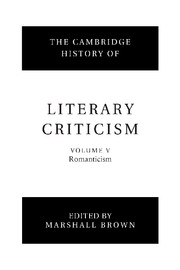Book contents
- Frontmatter
- Introduction
- 1 Classical standards in the period
- 2 Innovation and modernity
- 3 The French Revolution
- 4 Transcendental philosophy and Romantic criticism
- 5 Nature
- 6 Scientific models
- 7 Religion and literature
- 8 Language theory and the art of understanding
- 9 The transformation of rhetoric
- 10 Romantic irony
- 11 Theories of genre
- 12 Theory of the novel
- 13 The impact of Shakespeare
- 14 The vocation of criticism and the crisis of the republic of letters
- 15 Women, gender and literary criticism
- 16 Literary history and historicism
- 17 Literature and the other arts
- Bibliography
- Index
- References
10 - Romantic irony
Published online by Cambridge University Press: 28 March 2008
- Frontmatter
- Introduction
- 1 Classical standards in the period
- 2 Innovation and modernity
- 3 The French Revolution
- 4 Transcendental philosophy and Romantic criticism
- 5 Nature
- 6 Scientific models
- 7 Religion and literature
- 8 Language theory and the art of understanding
- 9 The transformation of rhetoric
- 10 Romantic irony
- 11 Theories of genre
- 12 Theory of the novel
- 13 The impact of Shakespeare
- 14 The vocation of criticism and the crisis of the republic of letters
- 15 Women, gender and literary criticism
- 16 Literary history and historicism
- 17 Literature and the other arts
- Bibliography
- Index
- References
Summary
Introduction
More than any other element of Romantic aesthetics, Romantic irony contradicts the pervasive popular view of what Romanticism means. Irony is the other side of Romanticism, attuned to rationality rather than feeling, to calculation rather than sentiment, to self-reflection rather than self-expression. Conventional accounts of Romanticism have often been distorted by failing to take account of its central role for romantic aesthetics, not just in the theoretical sites where one might expect to find it (most notably the German romantic theories of Friedrich Schlegel and Karl Solger), but in innumerable literary texts where one might simply read past it (the poetry of Keats, for instance, or Mary Shelley's Frankenstein). Seen genetically, Romantic irony links Romanticism both to the immediate past (to such late Enlightenment figures as Immanuel Kant or William Godwin) and to subsequent revivals of romantic sensibility or epistemology (Friedrich Nietzsche's self-critical romanticism, Oscar Wilde's aestheticism, even postmodern theory and practice). Indeed, a scrupulous genealogy of Romantic irony might well confirm Friedrich Schlegel's claim that it is the incomprehensibilities of irony on which, ‘the salvation of families and nations rests … and of states and systems’ (‘Ber die Unverständlichkeit’, Kritische Ausgabe, II, p. 370). Or if not that much, a good deal nonetheless.
Although irony has long had its own secure niche within literary criticism, it was the New Criticism of the 1940s that gave it a particularly privileged position within Anglo–American critical discourse. Cleanth Brooks articulated most forcefully the new role assigned to irony when he described it as ‘the most general term we have for the kind of qualification which the various elements in a context receive from the context’.
- Type
- Chapter
- Information
- The Cambridge History of Literary Criticism , pp. 203 - 225Publisher: Cambridge University PressPrint publication year: 2000
References
- 6
- Cited by



